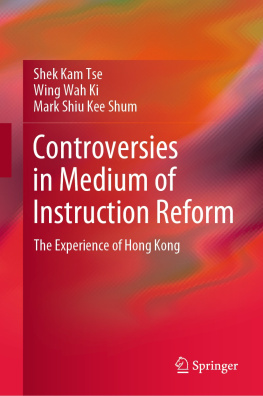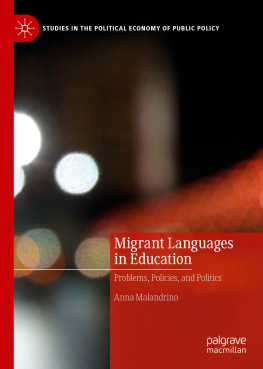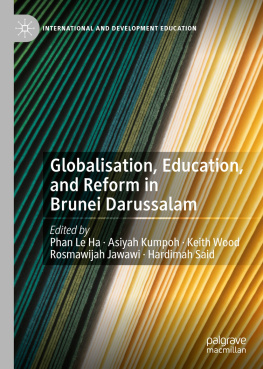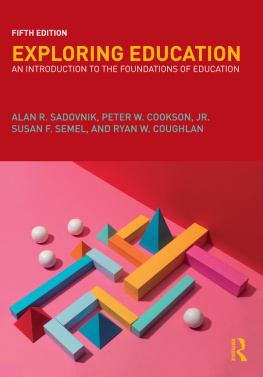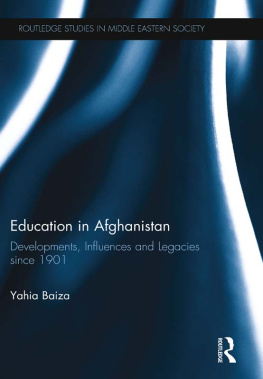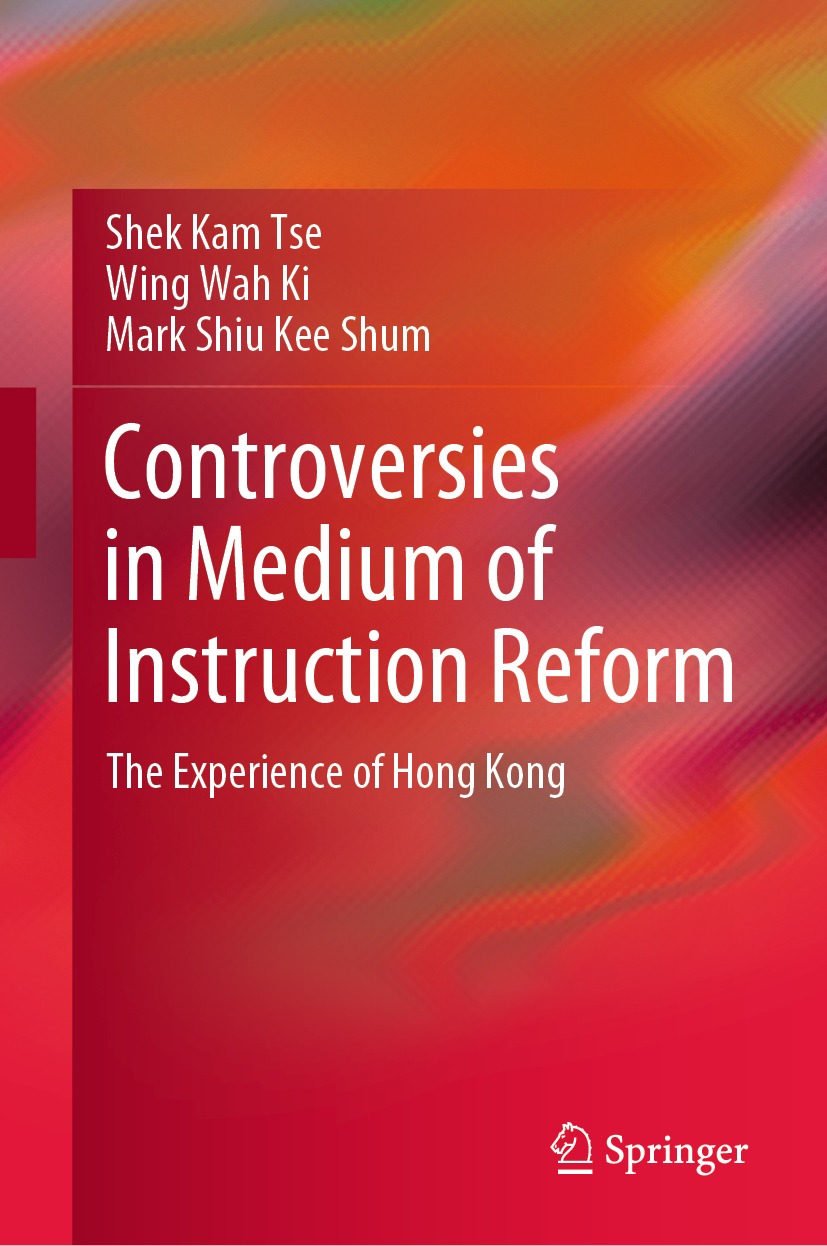Shek Kam Tse , Wing Wah Ki and Mark Shiu Kee Shum
Controversies in Medium of Instruction Reform
The Experience of Hong Kong
1st ed. 2021

Logo of the publisher
Shek Kam Tse
Faculty of Education, The University of Hong Kong, Hong Kong, Hong Kong
Wing Wah Ki
Faculty of Education, The University of Hong Kong, Hong Kong, Hong Kong
Mark Shiu Kee Shum
Faculty of Education, The University of Hong Kong, Hong Kong, Hong Kong
ISBN 978-981-16-5783-2 e-ISBN 978-981-16-5784-9
https://doi.org/10.1007/978-981-16-5784-9
Springer Nature Singapore Pte Ltd. 2021
This work is subject to copyright. All rights are reserved by the Publisher, whether the whole or part of the material is concerned, specifically the rights of translation, reprinting, reuse of illustrations, recitation, broadcasting, reproduction on microfilms or in any other physical way, and transmission or information storage and retrieval, electronic adaptation, computer software, or by similar or dissimilar methodology now known or hereafter developed.
The use of general descriptive names, registered names, trademarks, service marks, etc. in this publication does not imply, even in the absence of a specific statement, that such names are exempt from the relevant protective laws and regulations and therefore free for general use.
The publisher, the authors and the editors are safe to assume that the advice and information in this book are believed to be true and accurate at the date of publication. Neither the publisher nor the authors or the editors give a warranty, expressed or implied, with respect to the material contained herein or for any errors or omissions that may have been made. The publisher remains neutral with regard to jurisdictional claims in published maps and institutional affiliations.
This Springer imprint is published by the registered company Springer Nature Singapore Pte Ltd.
The registered company address is: 152 Beach Road, #21-01/04 Gateway East, Singapore 189721, Singapore
Foreword
In post-colonial situations, decisions about the appropriate language(s) of instruction to adopt for the children of the schools in a society have often been fraught. There are a number of arguments that can be raised in favour of complete rejection of the colonialists language and in favour of promoting the mother-tongue(s) of the people involved. But there are also arguments in favour of retaining some educational programs in the colonialists language. Especially is this so when the language is a major international language such as English. Arguments of this sort were important in Hong Kong even before the 1997 handover, though since then, they have become even more important and often quite vexed. The Hong Kong educational authorities and the schools sought to come to terms with the best kinds of policies to implement, not always with the happiest results. In many cases, attempts to provide educational programs in a mother-tongue other than English were perceived as offering a second-class experience; too often, English remained the preferred language because of its status and significance in the worlds of commerce, trade and business more generally.
This book offers a very thoughtful and comprehensive review of recent Hong Kong educational history, with important lessons for other societies still seeking to establish the best educational programs for their people, with particular reference to the language of instruction that is adopted. I congratulate the authors who have written a very illuminating volume.
Frances Christie
Acknowledgements
This book is the result of lot of work and reflection by many people over the past twenty more years. We have to thank many of our consultants, colleagues and collaborating school principals and teachers, for their valuable advice, support and assistance. They include Frances CHRISTIE, Ference MARTON, Amy TSUI, LEE Wing-On, Terry DOLAN, Elizabeth DOLAN, WONG Chi-kin, KWONG Wai-leung, LEE Kai Man, CHAN Yiu Man, CHAU Ha Sum, Flora LEUNG, LEUNG Shung-yu, HO Kim-kau Elizabeth, PANG Yuen-Wah Emily, HO Ki-to, TAM Yat-yuk and CHOI Sung-ki.
We also want to express our sincerest gratitude to the persons who reviewed our manuscripts, for their insightful comments and suggestions for improvements. Last but not least, we would like to thank the publisher who has given us this opportunity of sharing our reflection with readers, about this special part of education history of Hong Kong in the first two decades after its sovereignty returned to China, and the editing team for the careful work, patience and great understanding over the years, without which the book would not have been possible.
Contents
Springer Nature Singapore Pte Ltd. 2021
S. K. Tse et al. Controversies in Medium of Instruction Reform https://doi.org/10.1007/978-981-16-5784-9_1
1. Introduction
Shek Kam Tse
(1)
Faculty of Education, The University of Hong Kong, Hong Kong, Hong Kong
Shek Kam Tse (Corresponding author)
Email:
1.1 Introduction to the Book and the Chapter
The education system of a place affects the future of its society. In a place where the everyday language used in society is exactly the same as that is used by teachers in the classroom, there is usually no dilemma about its medium of instruction (MOI). However, problems may arise if the language the child speaks at home differs from the one that the teacher is using in lessons, and this is very often the case in Hong Kong.
Hong Kong had been a British colony from 1842 until its return to China in 1997 as a special administration region (SAR). For over hundred years, all legislature was appointed by British government and civil service ordinances were in English, with Chinese translations gradually being added over the years for reference. In the early years, the educational system that the colonial government introduced for expatriates was based on the system applying in England at that time. Naturally, English was used as MOI in classrooms. Gradually, education provision expanded and elite Chinese government helpers in Hong Kong also sent their children to these schools.
Following the Second World War and the revolution in China, educational provision had to be greatly expanded to accommodate the huge influx of refugees from Southern China. Yet, English remained the sole official language of Hong Kong until 1974, when Chinese was granted an equal status to that of English as an official language of Hong Kong, and questions soon began to be raised about whether English or Chinese should be used as the MOI in classrooms. Although there were various moves to raise the profile of Chinese language, the majority of secondary schools still used English as the MOI at the time of the 1997 handover.
Very soon after the handover, the new SAR government announced that, from September 1998, Chinese would be the default MOI for all junior secondary schools. Any schools wishing to use English as the MOI had to apply to the education authority for approval. This did not bring the language debate to an end. On the contrary, there was a serious split of view to the new policy, with quite a strong voice of uncertainty and opposition among schools and local parents. Notwithstanding the difference in views, the MOI reform was implemented, and it can now be regarded as an experimentation from which important lessons can be drawn for the future.

